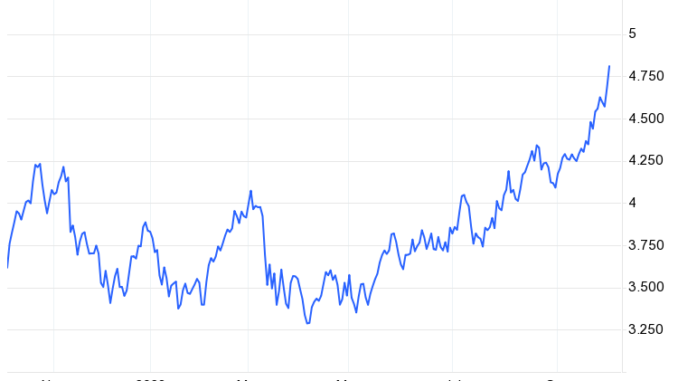
Mortgage rates and bond yields kept rising Tuesday as the job openings unexpectedly increased more than anticipated. But is that job openings data legit today? And will job openings continue higher, pushing mortgage rates even higher in the future? I believe today’s job openings data needs some context, but it didn’t matter to bond traders as bond yields shot up after the report.
The marketplace has been extremely wild since the Federal Reserve meeting when the Fed took a very hawkish tone in their forward outlook, sending the 10-year yield higher. As I write this article today, the 10-year yield is 4.79%, with mortgage rates at 7.72%. We can see the recent aggressive move before today’s action.
I have been in the camp that the Fed won’t pivot until jobless claims data breaks over 323,000 on the four-week moving average. The headline jobless claims is 204,000, and the four-week moving average is 211,000. So, this key data line hasn’t gotten better. However, the Federal Reserve has always favored the job openings data, so we must look there to see what is happening.
Job openings data
From the BLS: The number of job openings increased to 9.6 million on the last business day of August, the U.S. Bureau of Labor Statistics reported today. Over the month, the number of hires and total separations changed little at 5.9 million and 5.7 million, respectively.
Early in the COVID-19 recovery, I was the only person on planet Earth talking about job openings getting toward 10 million in this recovery.
Job openings data had such an impact on mortgage rates that you can see it in the 10-year yield after the data was released this morning. Some traders got a heads-up before the release and sent yields higher.
What about the report itself? First, the headline is misleading; we have a massive jump in job openings data, but it’s only from one sector. So, I wouldn’t say the labor data is accelerating, but the trend of job openings data getting softer is intact.
However, the key is that the labor market isn’t breaking as some on the Fed had hoped for in 2023. As shown below, job opening data should run with the long-term trend higher, and we are back to that level. Remember, population growth is slowing, and Baby Boomers leave the workforce each month.
QUITS Rate back to pre-COVID era
The real positive data line for the Fed is that the quit rate percentage is back to the COVID-19 era level; this data line is more key to the labor market than the headline job openings data. They want fewer people to quit their jobs for better paying jobs, so the fact that this data line is already back to the pre-COVID-19 level is probably one of the biggest reasons why the Fed is saying they might be done hiking rate, and could even cut next year.
The headline job openings data released today seems very strong, but reading the internals, it’s the same story. The labor market isn’t as tight as it used to be, but it isn’t cracking, meaning we aren’t on the verge of big job losses anytime soon. This will happen once the jobless claims data breaks over 323,000 on the four-week average.
However, as I’ve discussed in a recent HousingWire Daily podcast, the bond market has had itchy fingers since the Fed meeting when they gave a hawkish outlook. The dollar has gotten stronger, and the Bank of Japan needs to intervene again today. This is starting to look like this time last year when the world markets struggled with a stronger dollar.
Last year, London was going to lose its pension funds, the Bank of Japan intervened in their currency, and the IMF warned the Fed not to hike rates. We are getting the same vibe as last year, which means the bond market is oversold and we should see some mortgage rate relief soon. However, it’s job week, and we have three more labor reports coming out, so stay tuned.



